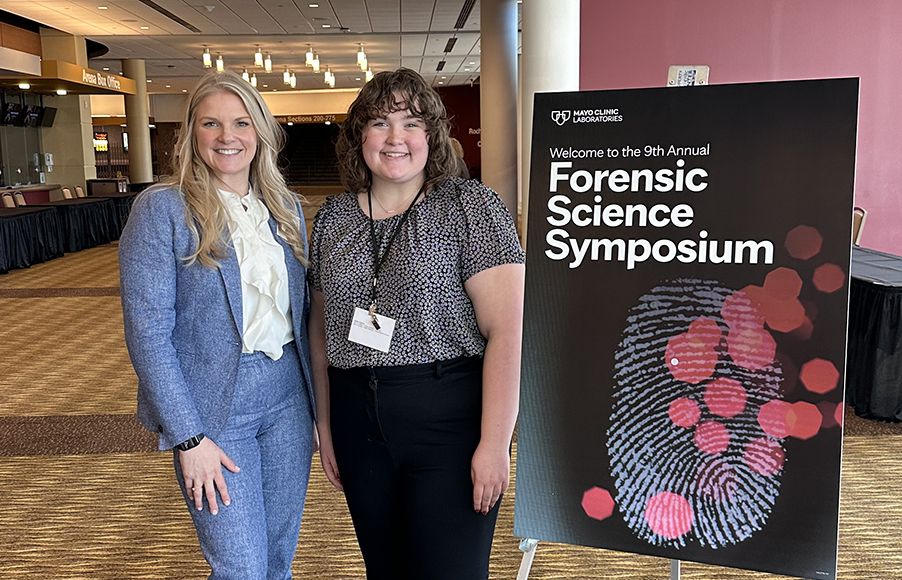Madeline Patterson B’24 knows first hand that stereotypical TV investigations aren’t exactly accurate.
Yet, during her recent forensic science internship with the Southern Minnesota Medical Examiner’s Office, through a partnership with the Mayo School of Health Sciences, surreal situations almost had her looking around for the cameras.
The recent biochemistry graduate credits both Saint Mary’s and her hands-on internship experience for helping her find her true passion for forensic science, a rewarding career that combines her love for science and her desire to find answers to puzzles.
Patterson said she started college not knowing what she wanted to major in, but she knew she liked science and began focusing on chemistry. Once her professors and advisers discovered she was interested in forensics, she pursued a minor in criminal justice and switched to biochemistry.
And after her on-the-job internship experience this past semester, she feels confident she is on the right career path.
Erica Reed, program director for the forensic internship for the Southern Minnesota Regional Medical Examiner’s Office, said the internship is designed to give students time and space to explore a variety of careers. The internship allows students to explore the field and build positive professional relationships with an end goal of developing the confidence and a sense of career direction through daily rotations. Patterson was the first Saint Mary’s student to be chosen for the experience.
“This internship brings students who are interested in the field of pathology into Mayo Clinic’s world-renowned pathology practice,” Reed said. “It is centered specifically in forensics within our medical examiner’s office and autopsy service. Some of the careers they interact with include medicolegal death investigators, autopsy technologists, office of decedent affairs specialists, pathologists’ assistants, pathologists, toxicologists, and medical examiners.”
Patterson was impressed by the quality of responsibilities she had and how closely she worked with death investigators and forensics pathologists. “I was able to go into autopsies and learn how those work,” she said. “I also went to scenes where individuals had died and learned what takes place, and I also learned how to talk to families, which is extremely difficult. I did a month of job shadowing the Office of Decedent Affairs and also Toxicology, which is more of what I want to do.
“My supervisor (Erica Reed) made it possible for me to shadow the head toxicologist who tests blood and urine for different toxins in the body,” she added. “I learned a lot about after-death care and how Mayo Clinic and others work together. Toxicology can’t get reports for two to three months after a death so families struggle because we can’t sign the death certificate until we have that information. I really enjoyed helping families and getting them answers that they need (for closure).”
Patterson said, because she didn’t take anatomy or physiology, she didn’t have experience working with a cadaver. “Seeing deceased individuals was a bit jarring but my supervisor gave me all the information and the support I needed. That’s what I was most nervous about,” she said. “I’m not really a squeamish person but it was good to know that I could handle it. Some people have found that this line of work is not for them, and that’s ok.”
She found it fascinating how her supervisor would arrive at a scene where someone had died and then she — and others in law enforcement — would determine whether or not it was a natural or unnatural death, like looking for prescriptions that might indicate a long-term health issue. They also saw cases of drug and alcohol overdose.
“It’s not as glamorous as on TV but some of the situations can be kind of out there,” she said. “Sometimes I thought, ‘where’s the camera?’ My supervisor was a huge help because I never felt like I was alone in dealing with these heavy subjects.”
“Due to the varied interests’ students may have, my goal as the program director is to offer a diverse experience that allows them to make an educated decision of a career choice,” Reed said. “With there being a large media space regarding forensics, it can easily be a misunderstood field. Being able to get real-life work experience in the area is important to understand what the different job opportunities are and how they all work together.”
Patterson appreciated learning about all of the different job opportunities within forensics — through not only the internship but also a Forensic Science Symposium hosted by Mayo Clinic, through which she learned about firearms, water rescue, and K-9 units. She also was able to network with past interns — several of whom do death investigation.
“We have hired many of our forensic science interns on staff at Mayo Clinic as death investigators, office of decedent affairs specialists, and autopsy technologists,” Reed said. “We also can assist them in the next steps of the education journey by providing recommendations. Pathology is definitely a growing, diverse and in-demand career field!”
“You don’t know what the actual job field looks like until you’re exposed to it,” Patterson said. “You can go in many different directions. I didn’t really know what I wanted to do, but after this internship, I know that research and lab work is something I’m really passionate about, and I’m applying for clinical lab science work. I have had a different drive and more of a passion since my internship. I’ve always had a passion for school and work, but being able to see it in real life was really gratifying.”
